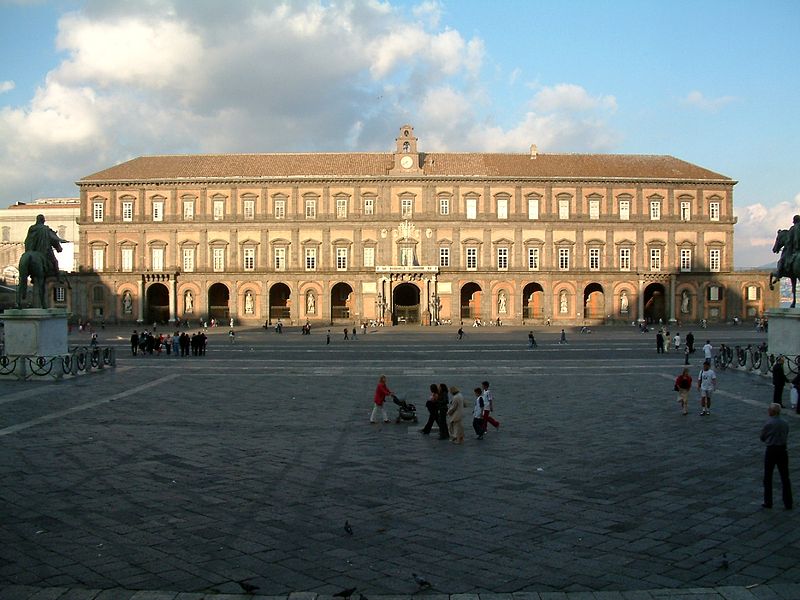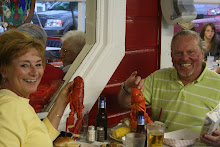We left Malta in some fairly high winds and heavy seas, and
it wasn’t until well into the evening that conditions improved marginally.
 |
| Big rock islands & gusty winds |
At sunrise
we found ourselves close to Naples and facing huge rock islands on our
approach. It was still very gusty directly on the beam, and opening the balcony
door to take some pictures practically blew the cabin apart.
 |
| "Totem Bella Donna Pace" |
We docked around
1000 and the ship was cleared for disembarkation. Since our tour wasn’t
scheduled to leave until 1300, we decided to do our own walk about the city.
With a history stretching back 2500 years, Naples is one of
the oldest continuously inhabited cities in the world and was long a cultural
center of the Greeks and Roman Empire.
 |
| Castel Nuovo |
“Napoli” enjoyed 500 years as a powerful
kingdom that attracted the finest artists and architects in Europe. As Italy’s
third-largest city with a metropolitan population of around 4 million, Naples
is one of Europe’s most important ports—a feature that led to it being the most
bombed Italian city in WWII. Its historic city center is a UNESCO World
Heritage Site (as is almost anything we see anymore!).
 |
| Front of Castel Nuovo |
The city lies between
two volcanic regions, Mt. Vesuvius and Campi Flegri, and the Roman ruins of
Pompeii and Herculaneum that were destroyed in the 79 AD eruption of Mt.
Vesuvius are visible nearby.
We began our walk at the cruise terminal monument Totem
Della Pace (which we renamed Totem Bella Donna Pace after Jane’s cousin’s
wife).
 |
| Glass-domed mall |
We wound our way through an adjacent construction site that brought us
to the Castel Nuovo, an imposing fortress on the water’s edge. Heading into
what seemed to be the business district (judging by the increasing number of
stores and rise in Jane’s heartbeat), we stumbled upon a very beautiful glass-domed
shopping mall highly decorated with reliefs, sculptures, paintings, and
beautiful mosaic floors.
 |
| Mosaic floor in mall |
We walked for several blocks through streets lined
with various shops until we came upon an open-air market. Jane was in her
element. She purchased some linens and a scarf ring and was happy with the
prices. Nearing lunchtime, we wanted to have some authentic Napoli pizza and
eat it right on the sidewalk just like the locals do.
 |
| Piazza fountain |
We found a great place
right next to a police station and had a couple of slices of really good pizza
and a beer. As we were leaving the café, we realized that the large open piazza
that we had been staring at during our lunch encompassed a very elegant
fountain that we had not noticed from our vantage point.
 |
| Detail of piazza fountain |
We started back towards
the ship, extracted some money from an ATM (the exchange rate has been very
favorable), and arrived on the pier just as the passengers for this tour time
were beginning to queue up.
 |
| Piazza del Plebiscito and Royal Palace |
Our tour was basically a panoramic bus ride to various
highlights of the city which included Greek and Roman monuments, and
Renaissance fineries. Because we had such a brief encounter with so many
features as we did our drive-by, it was difficult to capture all of the names,
history, and details that were being presented, so many of the images in this
post cannot be accurately captioned.
 |
| Mt. Vesuvius (R) in background |
One site we couldn’t miss was the Piazza
del Plebiscito, considered the city’s grandest public square, and the adjacent
former Royal Palace, but we just got a short glimpse of each as we rode by. We rode
to an upscale seaside district more on the outskirts of Naples that is popular
with summer tourists and stopped long enough for us to get off and take some
pictures.
 |
| Wooden boat yard |
The district was interesting, but what was really cool was a really
good view of Mt. Vesuvius a short distance away. Also at this stop were a
monument and a boatyard that contained only wooden boats.
 |
| Gesù Nuovo(L), Belltower, Santa Chiara(R) |
Our bus dropped us off just outside of Old Town and we
walked about 10 minutes to the Piazza del Gesù Nuovo. Here we viewed the
exterior of The Church of Gesù Nuovo, but we couldn’t view the interior as it
was not open. Instead we enjoyed a guided visit to the lovely cloisters of Basilica
Santa Chiara Monastery, founded in the 14th century by the king of
Naples.
 |
| Majolica tile in cloister |
The interesting features of these cloisters are the hand painted majolica
tiles that line the walls, octagonal columns, and courtyard and the much
degraded frescos cover the walls above.
 |
| Octagonal columns |
Leaving the cloisters, we were shown
the Spaccanapoli, a straight and narrow main street that traverses the old,
historic center of the city of Naples and literally means “Naples splitter.”
Here our guide left us and we had about 90 minutes of free time to explore on
our own.
 |
| Spaccanapoli |
We headed down one side of the Spaccanapoli while viewing the shops. Jane
found a chocolate shop and bought some Italian chocolate; the “finest in the
world” (and something we here everywhere we go!). We returned to the Piazza del
Gesù and proceeded in the opposite direction for a few blocks to see carbon
copies of stores from the other side.
 |
| Cloister frescoes |
We returned to the piazza to wait for our
group to assemble and return to the bus. Jane noticed that the doors of The
Church of Gesù Nuovo had opened and people were entering. Capt. Larry went in
to check it out and sure enough a mass was beginning.
 |
| Church of Gesù Nuovo |
He signaled for Jane to
come in and we viewed this magnificent baroque-style church until it was time
for our group to leave for the bus. We caught up with them and returned to the
ship, but were really glad we got to see this church. Back on board we returned
to the Italian specialty restaurant and had a great dinner with a shared table
with three other passengers. Our ship stayed in port until 0200 when we set
sail for Civitacheccia, the seaside port for Rome. Tomorrow was going to be
great!


















No comments:
Post a Comment